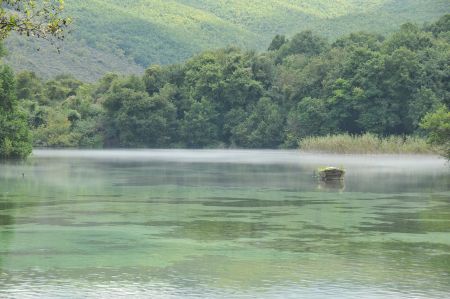The Ohrid Lake and its bubbling underground springs
- Written by Portal Editor
Lake Ohrid is one of the oldest lakes in the world, often referred to be the second oldest lake on the planet. Several times we have already reported about the lake whose water still has the quality of drinkable water and its environment in the Galicica National Park.
The age of the lake is estimated to be 2 to 5 million years by experts, the occurrence of endemic species suggests an evolution in the Pliocene, which means more than 2.6 million years ago. The lake was formed by a moat. The tectonic activities that are still occurring today, probably also cause the existence of a subaquatic mountain about 100 meters high.
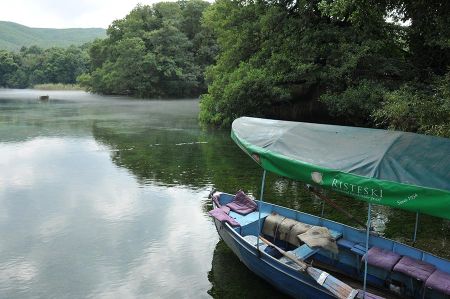 The Ohrid Lake, whose catchments area is 1,414 square kilometers, has no significant inflow, which can be easily noticed within the interesting roundabout along the lakeside by bike or by car. The lake is, however, fed by numerous spring streams. The most important source is one at the Sveti Naum Monastery. There, water emerges from the subsoil, which flows underground from the 200 m higher Prespa Lake to Lake Ohrid. However, whether this connection continuously exists or when and for how long it existed, is little researched in geological terms and is therefore not certain. It is possible that this connection is of a temporary nature and is opened and separated by geological processes in the karst rocks of the mountain massif between the two lakes. A natural act in any case.
The Ohrid Lake, whose catchments area is 1,414 square kilometers, has no significant inflow, which can be easily noticed within the interesting roundabout along the lakeside by bike or by car. The lake is, however, fed by numerous spring streams. The most important source is one at the Sveti Naum Monastery. There, water emerges from the subsoil, which flows underground from the 200 m higher Prespa Lake to Lake Ohrid. However, whether this connection continuously exists or when and for how long it existed, is little researched in geological terms and is therefore not certain. It is possible that this connection is of a temporary nature and is opened and separated by geological processes in the karst rocks of the mountain massif between the two lakes. A natural act in any case.
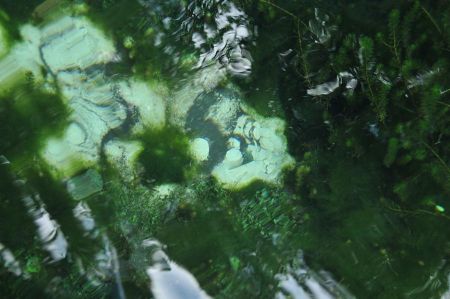 This magnificent and at the same time interesting destination is best being explored during your stay at Ohrid Lake by rowing boat, which can be hired at Sveti Naum. We were again on the spot and noticed, that, due to the autumn sun, misty veils had developed over the water, which additionally provided for some spectacular moments. For a really small money a rowing boat with charter leader is booked, which is ready for extensive explanations and above all knows the places of the springs exactly. You have to take a close look and avoid any wave-induced movements in the boat to see the small bubbling springs at the bottom of the karst, which have carried fine, white sand from the karst, which as a moving edge easily burrows. No question of visibility, because the water is so clear that one can clearly see every plant on the ground up to 4 meters deep.
This magnificent and at the same time interesting destination is best being explored during your stay at Ohrid Lake by rowing boat, which can be hired at Sveti Naum. We were again on the spot and noticed, that, due to the autumn sun, misty veils had developed over the water, which additionally provided for some spectacular moments. For a really small money a rowing boat with charter leader is booked, which is ready for extensive explanations and above all knows the places of the springs exactly. You have to take a close look and avoid any wave-induced movements in the boat to see the small bubbling springs at the bottom of the karst, which have carried fine, white sand from the karst, which as a moving edge easily burrows. No question of visibility, because the water is so clear that one can clearly see every plant on the ground up to 4 meters deep.
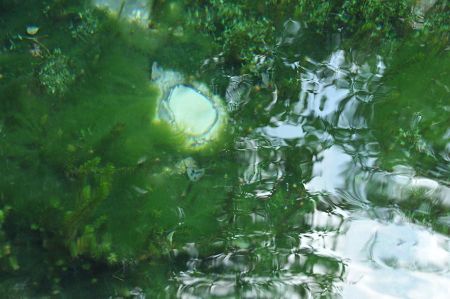 Of course, the water is ice cold, so it is not suitable for swimming, which is understandably prohibited in the spring lake too. If you want to try it anyway, it is recommended to swim at the nearby lake shore and swim through the spring stream, which flows into the lake. The difference in temperature can be recognized and seen by the color of the water. Another act of nature.
Of course, the water is ice cold, so it is not suitable for swimming, which is understandably prohibited in the spring lake too. If you want to try it anyway, it is recommended to swim at the nearby lake shore and swim through the spring stream, which flows into the lake. The difference in temperature can be recognized and seen by the color of the water. Another act of nature.
Particularly at the weekend Sveti Naum with its monastery facilities is also a popular destination for local tourists.
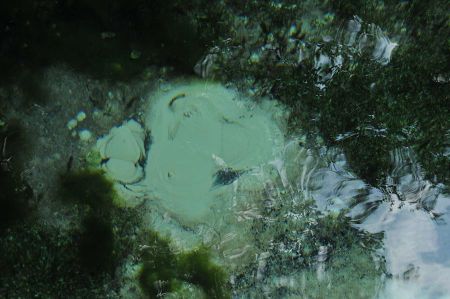 So if you prefer something less hustle and bustle, you should preferably come during the week. No question, there are numerous restaurants offering excellent food right next to the springs, in this way there is care for the physical wellness too. If you like it less touristy, the restaurant in the monastery building is recommended, which has an outdoor terrace overlooking the lake. Every now and then one of the passenger ships from Ohrid arrives at the monastery, which is also an alternative option for the journey.
So if you prefer something less hustle and bustle, you should preferably come during the week. No question, there are numerous restaurants offering excellent food right next to the springs, in this way there is care for the physical wellness too. If you like it less touristy, the restaurant in the monastery building is recommended, which has an outdoor terrace overlooking the lake. Every now and then one of the passenger ships from Ohrid arrives at the monastery, which is also an alternative option for the journey.
Lake Ohrid and its bubbling underground springs
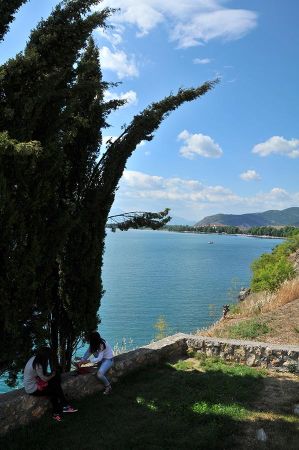 Nestled between North Macedonia and Albania, Lake Ohrid is not only one of the oldest and deepest lakes in Europe, but also a true natural wonder. With its impressive clarity, rich ecosystem and fascinating underground springs, the lake attracts numerous visitors every year.
Nestled between North Macedonia and Albania, Lake Ohrid is not only one of the oldest and deepest lakes in Europe, but also a true natural wonder. With its impressive clarity, rich ecosystem and fascinating underground springs, the lake attracts numerous visitors every year.
A lake of impressive age and history
Lake Ohrid is estimated to be around 1 to 3 million years old, making it one of the oldest lakes in the world. This long history has led to the development of unique species found nowhere else in the world.
The area surrounding the lake is rich in history and culture. The town of Ohrid in particular, which is recognized as a UNESCO World Heritage Site, offers a fascinating insight into the region's past with its churches, monasteries and ancient ruins.
The mysterious underground springs
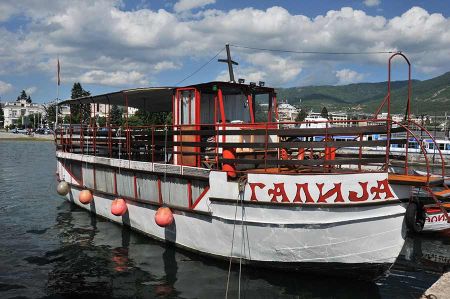 One of Lake Ohrid's most fascinating phenomena is its underground springs. These springs, fed from the neighbouring Lake Prespa, bubble into Lake Ohrid through underground karst channels.
One of Lake Ohrid's most fascinating phenomena is its underground springs. These springs, fed from the neighbouring Lake Prespa, bubble into Lake Ohrid through underground karst channels.
The springs are mainly located near the monastery of Sveti Naum, one of the most famous sights on the southern shore of the lake. Here one can observe how the water seemingly "bubbles" out of the ground and flows into the lake.
The water from the springs is crystal clear and of remarkable purity. It ensures that Lake Ohrid is always supplied with fresh water, which contributes to the lake's exceptional clarity.
A unique ecosystem
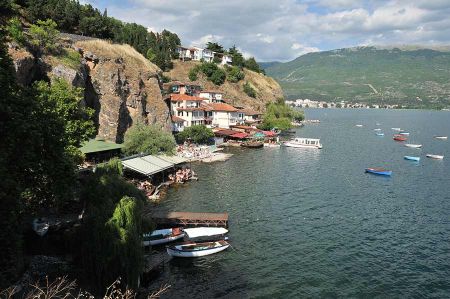 Lake Ohrid is home to a variety of plant and animal species, many of which are endemic. Particularly well-known are the Ohrid trout (Salmo letnica) and the Ohrid roach (Alburnus ohridana), which are only found in this lake.
Lake Ohrid is home to a variety of plant and animal species, many of which are endemic. Particularly well-known are the Ohrid trout (Salmo letnica) and the Ohrid roach (Alburnus ohridana), which are only found in this lake.
The lake's ecosystem is so unique that it is often compared to a living museum. Scientists from all over the world come here to study the lake's flora and fauna.
Activities around Lake Ohrid
Lake Ohrid offers numerous opportunities for leisure activities. Whether boat tours, diving, swimming or hiking - there is something for everyone here.
A particularly popular destination is the aforementioned Sveti Naum monastery, which is worth a visit not only because of its historical significance, but also because of its picturesque location right on the lake.
The city of Ohrid itself is also a highlight. With its narrow streets, traditional houses and the impressive fortress of Tsar Samuil, it offers a mixture of history and modern charm.
The importance of the lake for the region
Lake Ohrid is not only a natural wonder, but also an important source of livelihood for the people of the region. Fishing, tourism and agriculture benefit directly from this exceptional body of water.
At the same time, however, the lake also faces challenges, particularly from pollution and climate change. There are numerous efforts to protect the lake and its unique ecosystem so that future generations can also enjoy this natural wonder.
Conclusion
Lake Ohrid and its bubbling underground springs are an unparalleled natural phenomenon that combines history, culture and nature in a unique way. A visit to this region is not only a journey into one of Europe's most beautiful landscapes, but also an opportunity to experience the fascinating geology and rich heritage of this special lake.
Whether you are looking for the peace and beauty of nature, want to explore historical sites or simply enjoy the clarity of the water - Lake Ohrid has something to offer everyone.
Enjoy your stay and read as well:
Autumnal city tour in Ohrid with camper friends
Day trip to Lychnidos - today called Ohrid
-
 Springs at Sveti Naum Ohrid Lake
Springs at Sveti Naum Ohrid Lake
Springs at Sveti Naum Ohrid Lake
Springs at Sveti Naum Ohrid Lake
-
 Springs at Sveti Naum Ohrid Lake
Springs at Sveti Naum Ohrid Lake
Springs at Sveti Naum Ohrid Lake
Springs at Sveti Naum Ohrid Lake
-
 Springs at Sveti Naum Ohrid Lake
Springs at Sveti Naum Ohrid Lake
Springs at Sveti Naum Ohrid Lake
Springs at Sveti Naum Ohrid Lake
-
 Springs at Sveti Naum Ohrid Lake
Springs at Sveti Naum Ohrid Lake
Springs at Sveti Naum Ohrid Lake
Springs at Sveti Naum Ohrid Lake
-
 Springs at Sveti Naum Ohrid Lake
Springs at Sveti Naum Ohrid Lake
Springs at Sveti Naum Ohrid Lake
Springs at Sveti Naum Ohrid Lake
-
 Springs at Sveti Naum Ohrid Lake
Springs at Sveti Naum Ohrid Lake
Springs at Sveti Naum Ohrid Lake
Springs at Sveti Naum Ohrid Lake
-
 Springs at Sveti Naum Ohrid Lake
Springs at Sveti Naum Ohrid Lake
Springs at Sveti Naum Ohrid Lake
Springs at Sveti Naum Ohrid Lake
-
 Springs at Sveti Naum Ohrid Lake
Springs at Sveti Naum Ohrid Lake
Springs at Sveti Naum Ohrid Lake
Springs at Sveti Naum Ohrid Lake
-
 Springs at Sveti Naum Ohrid Lake
Springs at Sveti Naum Ohrid Lake
Springs at Sveti Naum Ohrid Lake
Springs at Sveti Naum Ohrid Lake
-
 Springs at Sveti Naum Ohrid Lake
Springs at Sveti Naum Ohrid Lake
Springs at Sveti Naum Ohrid Lake
Springs at Sveti Naum Ohrid Lake
-
 Springs at Sveti Naum Ohrid Lake
Springs at Sveti Naum Ohrid Lake
Springs at Sveti Naum Ohrid Lake
Springs at Sveti Naum Ohrid Lake
-
 Springs at Sveti Naum Ohrid Lake
Springs at Sveti Naum Ohrid Lake
Springs at Sveti Naum Ohrid Lake
Springs at Sveti Naum Ohrid Lake
-
 Springs at Sveti Naum Ohrid Lake
Springs at Sveti Naum Ohrid Lake
Springs at Sveti Naum Ohrid Lake
Springs at Sveti Naum Ohrid Lake
-
 Springs at Sveti Naum Ohrid Lake
Springs at Sveti Naum Ohrid Lake
Springs at Sveti Naum Ohrid Lake
Springs at Sveti Naum Ohrid Lake
-
 Springs at Sveti Naum Ohrid Lake
Springs at Sveti Naum Ohrid Lake
Springs at Sveti Naum Ohrid Lake
Springs at Sveti Naum Ohrid Lake
-
 Springs at Sveti Naum Ohrid Lake
Springs at Sveti Naum Ohrid Lake
Springs at Sveti Naum Ohrid Lake
Springs at Sveti Naum Ohrid Lake
-
 Springs at Sveti Naum Ohrid Lake
Springs at Sveti Naum Ohrid Lake
Springs at Sveti Naum Ohrid Lake
Springs at Sveti Naum Ohrid Lake
-
 Springs at Sveti Naum Ohrid Lake
Springs at Sveti Naum Ohrid Lake
Springs at Sveti Naum Ohrid Lake
Springs at Sveti Naum Ohrid Lake
-
 Springs at Sveti Naum Ohrid Lake
Springs at Sveti Naum Ohrid Lake
Springs at Sveti Naum Ohrid Lake
Springs at Sveti Naum Ohrid Lake
-
 Springs at Sveti Naum Ohrid Lake
Springs at Sveti Naum Ohrid Lake
Springs at Sveti Naum Ohrid Lake
Springs at Sveti Naum Ohrid Lake
-
 Springs at Sveti Naum Ohrid Lake
Springs at Sveti Naum Ohrid Lake
Springs at Sveti Naum Ohrid Lake
Springs at Sveti Naum Ohrid Lake
-
 Springs at Sveti Naum Ohrid Lake
Springs at Sveti Naum Ohrid Lake
Springs at Sveti Naum Ohrid Lake
Springs at Sveti Naum Ohrid Lake
-
 Springs at Sveti Naum Ohrid Lake
Springs at Sveti Naum Ohrid Lake
Springs at Sveti Naum Ohrid Lake
Springs at Sveti Naum Ohrid Lake
-
 Springs at Sveti Naum Ohrid Lake
Springs at Sveti Naum Ohrid Lake
Springs at Sveti Naum Ohrid Lake
Springs at Sveti Naum Ohrid Lake
https://www.alaturka.info/en/macedonia/ohrid/3477-the-ohrid-lake-and-its-bubbling-underground-springs#sigProId31d840df3e
